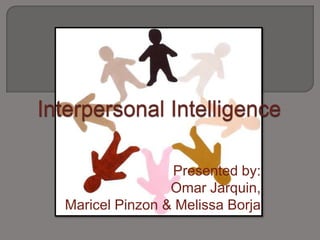
Interpersonal intelligence
- 1. Interpersonal Intelligence Presented by: Omar Jarquin, Maricel Pinzon & Melissa Borja
- 2. Definition:Understanding Interpersonal Intelligence Involves the ability to work cooperatively with others in a group as well as the ability to communicate, verbally and non-verbally with other people. It builds on the capacity to notice distinctions among others; for example, contrasts in moods, temperament, motivations, and intentions.
- 3. Continuation- In the more advanced forms of this intelligence, one can literally pass over into another’s perspective and read their intentions and desires. Interpersonally skilled students enjoy interacting with others of similar or diverse ages.
- 4. Interpersonal Intelligence Qualities With a capacity to influence their peers, they often excel at group work, team efforts, and collaborative projects. With this type of intelligence, one can have genuine empathy for another’s feelings, fears, anticipations, and beliefs. This form of intelligence is usually highly developed in such people as counselors, teachers, therapists, politicians, religious leaders, and skilled parents.
- 5. Who has Interpersonal Intelligence?? Counselor Politician Sales Person Teachers
- 6. It is likely that a person with well-developed Interpersonal Intelligence: Bonds with parents and interacts with others. Forms and maintains social relationships. Recognizes and uses a variety of ways to relate to others. Acknowledges the feelings, thoughts, motivations, behaviors, and lifestyles of others. Understands and communicates effectively in both verbal and non-verbal ways. Considers diverse perspectives in any social or political issue. Influences the opinions or actions of others.
- 7. Interpersonal Learning Processes Establishing a Positive Interpersonal Environment Criteria for Effective Groups Determining Class Values and rules Determining Schoolwide Values Class Meetings
- 8. Criteria for Effective Groups The classroom’s environment is warm and accepting. Classroom rules, mutually established by students and teacher, define appropriate codes of conduct and are based on human values such as helpfulness and fairness. An emphasis on collaborative learning removes the win/lose pattern prevalent in many classrooms. Learning is the well-articulated mission of the classroom. Opportunities are available for students to develop social, affective, and ethical skills in addition to academic ones.
- 9. Determining Class Values and Rules It is important for each classroom to establish explicit codes of conduct based on important human values. When students know what is expected of them and their peers, positive relationships can develop more easily. Many teachers involve their students in determining classroom values and rules at the beginning of the school year or a new term.
- 10. Determining School wide Values In addition to efforts by individual classrooms to identify codes of conduct, some schools embrace shared values schoolwide. Class Meetings Once classroom rules and values are in place, student relationships can be strengthened. Often this can be accomplished by conducting class meetings once daily or weekly. Guidelines for conducting class meetings
- 11. Collaborative Learning Collaborative Grouping Considerations Students Roles Social Skills Cooperative Learning Activities
- 12. What is interpersonal intelligence? Who has interpersonal intelligence? What are some signs of interpersonal intelligence?
- 13. Conflict Management Teachers can introduce conflict management by having students identify common causes of conflict. Have them list as many causes of conflict they can think of. Then, Discuss and analyze the causes of conflict– student might than seek positive resolutions.
- 14. Conflict Management Common Causes of Conflict Individual needs are not being met. Power is inequitably distributed Communication is ineffective or non-existent Perception of a situation varies. Learning approaches or personalities differ.
- 15. Gordon’s ConflictManagement Process Step 1: Identify and define conflict Step 2: Brainstorm possible solutions Step 3:Disscuss the potential solutions Step 4: Select the best Solution Step 5: Develop a plan to implement the solution Step 6:Impliment, then review and modify the solution Parent Effectiveness Training, Gordon (2000)
- 16. Learning through Service Volunteer Information Center Club or Co-Curricular Activity Community Service Credit Service as Authentic Application of an Existing Course Community Service Class Community Service as a School wide Commitment Incorporating Service into a school program [P.164-165]
- 17. Quick Review What are some ways teachers can deal with conflict? What are some common causes of conflict? How can students learn through service?
- 18. Developing Multiple Perspectives THINK 1.) What is perspective? 2.)What are some strategies I can use in my teaching to encourage perspective?
- 21. What is perspective? Different ways of seeing, perceiving, and experiencing the world around us. What affects perspective? 1.) Life experience 2.) Value Systems 3.) Assumptions 4.) Expectations
- 22. Intellectual Pluralism The capacity to analyze or evaluate different or opposing perspectives. Pro-Life VS Pro Choice Hitler and the Holocaust D.I. VS Success for All VS Free Teaching
- 23. Strategies for the Classroom 1.) Acknowledging perceptions of others 2.) Understanding diverse points of view 3.) Reflecting on current events from several perspectives 4.) Considering global implications 5.) Thinking Systematically
- 24. The Multicultural Classroom Teaching in perspectives from other cultures helps develop students’ critical and diverse thinking skills, encourages open-mindedness, and promotes awareness of the world around them.
- 25. What is perspective? What is intellectual pluralism? What are some advantages of teaching in a multicultural classroom?
- 26. FUN TIME =)
- 27. Fear in Hat
- 28. Human Knot
